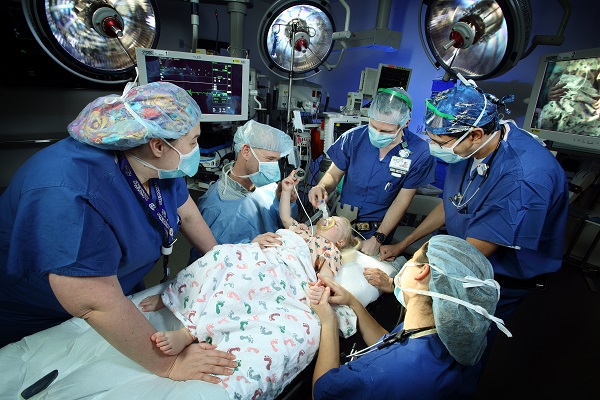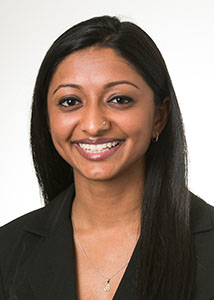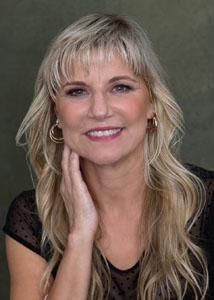
Welcome to the Pediatric Anesthesiology Fellowship Program at the Johns Hopkins University School of Medicine, a one year ACGME-accredited program. Johns Hopkins is not only one of the best-known health-care institutions in the world rich with history and tradition, but it remains a center of excellence and innovation in education, research, technology, and medicine.
Dr. Alfred Blalock, Dr. Helen Taussig, and Mr. Vivien Thomas performed the first ever congenital cardiac surgery on an infant here in 1944. Dr. Myron Yaster, the founder of the Society for Pediatric Anesthesia, created one of the very first pediatric pain management services in the nation in 1989 at the Johns Hopkins Children’s Center.
Our faculty continue to engage in discovery every day through clinical, basic, translational, and quality and safety research, biomedical data science, medical operations and informatics, and education. Our faculty, fellows, and staff advocate for better care for children and their families not only in our own community, but everywhere.
Our graduates have gone on to become leaders in the field of Pediatric Anesthesiology throughout the nation and abroad.
Whether you’re interested in academic medicine, private practice, or global health, our multidisciplinary program is designed to combine advanced clinical training, multifaceted educational opportunities, and innovative research activities to prepare graduates for any career in pediatric anesthesiology. A two year non-ACGME-accredited fellowship is available to applicants interested in independent research and pediatric cardiac anesthesiology.
The 12-month Pediatric Anesthesiology Fellowship consists of:
- Pediatric Operating Rooms Rotations (28 weeks) will be divided into several 2-to-4-week blocks that expose fellows to a wide range of cases including but not limited to common and rare pediatric surgeries, neonatal emergencies, transplants, burns, trauma surgeries, congenital heart surgeries, and difficult airway emergencies in our dedicated pediatric operating rooms in the Children’s Center. Fellows will also have, on average, one non-clinical day per week to participate in the Scholarship in Academic Anesthesia component to the fellowship.
- Pediatric Pain Management Rotation (4 weeks) that exposes fellows to a unique variety of complex medical and surgical patients, basic and advanced regional anesthesia techniques, acute postoperative pain management, chronic inpatient and outpatient pain management, and palliative care.
- Critical Care Rotations (4weeks) where fellows may elect to spend 2-week blocks in either the 28-bed Pediatric Intensive Care Unit (PICU), the 12-bed Pediatric Cardiac Intensive Care Unit (PCICU), or the 45-bed Neonatal Intensive Care Unit (NICU)
- Regional Anesthesiology – While we do not have a formal regional anesthesia rotation at the East Baltimore Campus, fellows perform their own regional anesthetics during their Pediatric Operating Room Rotations. In addition, the fellows have more opportunities to perform peripheral nerve blocks, peripheral nerve catheters, caudal and epidural catheters, and spinal anesthetics with the supervision of a member of our Advanced Pediatric Regional Anesthesiology Team during the rotation.
- Cardiac Anesthesiology – Fellows will spend a total of 12 weeks rotating through the pediatric cardiac operating room and cardiovascular diagnostic laboratory. Rotations will be completed in 2-week blocks throughout the year.
- Children’s Center for Perioperative Optimization Clinic (CCPO) – Pediatric Anesthesiology Fellows spend at least one day per month medically preparing patients and their families for surgery at the Children’s Center for Perioperative Optimization Clinic at the Harriet Lane Clinic across the street from the Children’s Center: https://anesthesiology.hopkinsmedicine.org/childrens-center-for-perioperative-optimization/
- Vacation (4 weeks) including additional time off to attend the SPA-AAP Pediatric Anesthesiology Annual Meeting, to interview for future career opportunities, and during the December holidays.
The Pediatric Anesthesiology Fellowship at Johns Hopkins has a strong clinical experience with approximately 10,500 cases per year shared by:
- 9 General Operating Rooms
- 1 Pediatric Cardiac OR
- 1 Pediatric Endoscopy Suite
- 1 Procedure Room
- Several Non-Operating Room Areas (NORA) including:
- A second Procedure Room in the Outpatient Pediatric Oncology Clinic
- Cardiovascular Diagnostic Lab (CVDL)
- Position Emission Tomography Scan (PET scan)
- Nuclear Magnetic Resonance (NMR)
- Magnetic Resonance Imaging (MRI)
- Interventional Radiology (IR)
- Neuro-interventional Radiology (NIR)
- Radiation Oncology (XRT)
- CT, US, and other radiology suites
Accredited by: Accreditation Council for Graduate Medical Education (ACGME) Program No. 0422321028
Duration of Program: 1 Year fellowship Program
Positions Available: 6
Application registration for fellowship opens on January 8th, 2024, through the San Francisco (SF) Match. Interviews will take place between March and June. Match Day will be on June 25th,2024. More information about the application process can be found on the SF Match website: https://www.sfmatch.org/specialty/pediatric-anesthesiology--fellowship/Timetable
Applicant Qualifications: Three years of Clinical Anesthesiology training in an ACGME accredited program
Goals of Successful Training in Pediatric Anesthesiology
The goal of the Johns Hopkins University School of Medicine’s Pediatric Anesthesiology Fellowship curriculum is to facilitate the development of knowledge, attitudes, and skills necessary to provide advanced peri-operative care of children of all ages and abilities that is both patient- and family-centered which includes general anesthesia, regional anesthesia, and/or sedation for routine and complex procedures.
- Orientation: A one-week series in the beginning of the fellowship that covers key topics in pediatric anesthesiology & developmental stages, and system-based practice (including operating room flow and equipment, post-anesthesia care unit, the pre-operative unit, EPIC, and PALS)
- Virtual Lecture Series: Using the oral board review course developed by The PassMachine®, fellows will have access to virtual lectures covering the fundamentals of pediatric anesthesiology. Lectures in this course are paired with in-person sessions delivered by Johns Hopkins faculty members to reinforced key concepts and prepare fellows for the pediatric anesthesia fellowship examination.
- Fellow Educational Series: Weekly 45-minute didactic sessions that focus on advancing fellow knowledge through active problem and case-based learning discussions in accordance with the SPA Medical Knowledge Goals & Objectives
- Fellow Professional Development Series: Weekly 60-minute learning sessions that focus on career preparation, mentoring, exposure to multiple, diverse and exciting research opportunities, and preparation for life-long and self-directed learning in pediatric anesthesiology.
- Oral and Written Board Exam Preparation: Individual and group sessions with faculty, including ABA Examiners , beginning in January that focus on the advancement of medical knowledge, keywords, and exam-taking techniques in preparation for the ABA Applied Examination.
- Journal Club Series: Every other month sessions attended by faculty and led by a fellow who introduces a landmark study or article of interest and critically examines the impact and relevance the paper has on discovery and patient care. The goal of this series is to lay the foundation for advanced critical thinking by evaluating study design, reviewing basic statistics, and relating research to clinical practice.
- Grand Rounds Series: The Department of Anesthesiology & Critical Care Medicine (ACCM) Grand Rounds take place every Thursday at 7:00am in historic Hurd Hall and fellows are expected to attend these exceptional learning sessions.
- PEDI-20 Series: Fellows choose 2 educational topics from the ACGME Clinical Core Competencies to present each year to the Anesthesiology Residents during their rotation in Pediatric Anesthesiology. These 20-minute teaching sessions are mentored by one of our experienced faculty and help each fellow build a repertoire of teaching sessions that they may use in their future careers.
- Quality Assurance Conference (QUAC): Fellows lead 2 case-based discussions per year that present challenges to perioperative and/or pain management covering one of the ACGME Clinical Core Competencies at our monthly divisional Quality Assurance Conference.
We believe there’s no better place to explore a career in academic anesthesia than here at Johns Hopkins! That’s why we developed the Scholarship in Academic Anesthesia component to the pediatric anesthesia fellowship. This robust and immersive experience provides opportunities to participate in education, teaching, quality improvement, research, and the dissemination of knowledge during your time at Hopkins. Fellows receive the same amount of non-clinical time as a junior faculty member (around 20-25 days) to engage in academia and participate in scholarly work. At the completion of fellowship, trainees will better understand their interest in an academic career. Fellows are expected to complete a scholarly project and present their work through publication or presentation at local, regional, national, or international meetings.
Following graduation, fellows become members of the Johns Hopkins Pediatric Anesthesia Alumni Network, a career-long collaboration for knowledge sharing and mentorship spanning institutions across the country.
- Simulation Center Sessions: Multiple 4-hour long high-fidelity simulation sessions each year will be held in the state-of-the-art Johns Hopkins Medicine Simulation Center (LINK) where fellows challenge their knowledge, hone and refine advanced technical skills, and practice valuable tools for communicating with patients and families.
- Basic and Advanced Fellow Boot Camps: Participation in two full-day national Pediatric Anesthesiology Fellow Boot Camps, hosted at the Children’s Hospital of Philadelphia each September and at the Johns Hopkins Children’s Center each May.
- ABA OSCE Preparation: Annual ACCM-sponsored mock-OSCE session held for fellows of all Johns Hopkins Anesthesiology Fellowship Programs in preparation for the ABA Applied Examination.
The Division of Pediatric Anesthesiology and Critical Care Medicine offers a variety of benefits. Fellows are provided medical, dental, vision, prescription insurances, with optional coverages including disability, accidental death and dismemberment, and family coverage. Detailed benefit information can be found at https://www.hopkinsmedicine.org/som/offices/registrars/benefits/postdoc-fellows.html. In addition to these benefits, the Division offers additional coverage for spouses, children, and dependents at no additional cost.
We also offer each fellow the following educational benefits:
- Yearly Professional Allotment (YPA) of $1650 to use for computers, traveling, educational purposes, parking, etc.
- A one-time $400 textbook allotment
- $1100 allotment to attend the SPA-AAP Pediatric Anesthesiology annual meeting (ALL fellows are encouraged to attend)
- Pediatric Advanced Life Support training (PALS) Certification at no cost
- Society for Pediatric Anesthesia, Society for Pediatric Pain Medicine, and Congenital Cardiac Anesthesia Society membership
Miscellaneous benefits for each fellow includes:
- One complementary white coat
- Four weeks of vacation plus additional time off during the holidays, the SPA-AAP Pediatric Anesthesiology annual meeting, board preparation, and job interviews
- Paid maternity or paternity leave
PGY-Level Annual Salary for the 2023-2024 Academic Calendar
(Salary Pay Scales are adjusted every fiscal year on July 1st)
- PGY-5 $80,170
- PGY-6 $84,094
- PGY-7 $87,054
- PGY-8 $89,688
- PGY-9 $94,568
Moonlighting:
- Clinical fellows may moonlight after filing a Moonlighting Request Form and receiving signed approval from the Program Director & Associate Dean for Graduate Medical Education
- The fellow will be responsible for obtaining an unrestricted license to practice medicine in MD, a controlled dangerous substance registration in MD, and a DEA registration
- The number of hours worked in moonlighting activities together with the hours worked in the fellowship may not exceed the ACGME guidelines for work hours
- Any individual sponsored on a visa may not be permitted to engage in moonlighting activities
Armstrong Institute’s Patient Safety and Quality Leadership Academy
(https://www.hopkinsmedicine.org/armstrong_institute/programs/get_involved/training_education/leadership_academy.html)
- If accepted, the cost of the program is waived for clinical fellows
- The Division of Pediatric Anesthesiology will accommodate non-clinical time for in-person sessions
- For more information, contact: [email protected]
T32 Postdoctoral Training Program for Clinician Scientists supported by the NIH
(https://anesthesiology.hopkinsmedicine.org/postdoctoral-training-program-for-clinician-scientist-t32-funded/)
- A program designed to launch an independent research career after completing the Pediatric Anesthesiology Fellowship
- For more information, contact Allan Gottschalk, MD, PhD: [email protected]
Pediatric Cardiac Anesthesiology Fellowship
- A second-year non-ACGME accredited training program
- For more information, contact Dheeraj Goswami, MD: [email protected]
A core value of the Pediatric Anesthesiology Fellowship is diversity, equity, and inclusion. We are an equal opportunity employer, and we do not discriminate based on age, disability, color, creed, ethnicity, gender, gender expression, gender identity, marital status, military or veteran status, national origin, race, religion, or sexual orientation. We are committed to embracing and celebrating our differences, educating and developing our faculty, fellows, and staff about diversity, inclusion, and equity, and we actively engage in equitable healthcare delivery and practices. For more information, go to https://www.hopkinsmedicine.org/diversity/
The Johns Hopkins School of Medicine Graduate Medical Education enterprise is dedicated to instilling in our residents and fellows the clinical, teaching, and research knowledge, attitudes, and skills critical to becoming future leaders in medicine who are worthy of the public’s trust.
Our residents and fellows will:
- Provide compassionate, patient-centered care;
- Understand social determinants of health and combat health inequities and structural injustice confronting our patients and the communities we serve;
- Deliver care of the highest quality and value;
- Develop skills to become excellent physicians, scientists, and innovators in the field.
We value diversity, equity and inclusion, and foster the practice of teamwork, professionalism, and academic excellence. We accomplish these shared goals in a supportive and collaborative environment with world-class faculty mentorship. For more information, go to https://www.hopkinsmedicine.org/som/gme/
The mission of the Clinical Fellows Council is to support the unique needs of clinical fellows throughout the Johns Hopkins University School of Medicine by fostering professional growth, clarifying available resources and organizing social events. For more information, go to http://clinical-fellows-council.jhmi.edu/.
For application eligibility, you must have completed 3 years of training in an ACGME-accredited anesthesiology residency program and be board-eligible or board-certified as approved by the Anesthesiology Residency Review Committee (RRC). We proudly participate fully in the San Francisco Match Program and only accept applications submitted through the SF Program. We conduct interviews from March through June. The fellowship officially begins on either July 1st or August 1st depending on the agreement between the Program Director and incoming fellow.
EXCEPTIONS: Applications are accepted outside the usual cycle and SF Match from active military personnel and candidates seeking an additional year of training in another fellowship in anesthesiology or research. If a position becomes available, we will accept applications from exceptional graduates of non-ACGME-accredited anesthesiology residency programs. Please contact the Program Coordinator for additional information.
The following are minimum requirements for consideration for the fellowship interview:
- Transcript of medical school record, certified by the medical school
- Medical School Dean’s letter of recommendation
- Three letters of recommendation
- Completed application via SF Match only
- Visa status information if pertinent
- CA-1 In-Training Exam (ITE) score and percentile (and CA-2 ITE report when available in the spring)
- Answers to 3 questions from the Society for Pediatric Anesthesia's Website. Please follow this link for further instructions: ACGME Pediatric Anesthesiology Fellowship (Society for Pediatric Anesthesia).
Contact Information
Pediatric Anesthesia Fellowship
Department of Anesthesiology and Critical Care Medicine
The Johns Hopkins Medical Institutions
Bloomberg Children’s Center
1800 Orleans Street
Baltimore, MD 21287
410-955-2393

Program Director
Pooja O’Neil, MD, MBA
[email protected]

Medical Training Coordinator
Sherrie Fornoff
[email protected]
(410) 955-2393
Follow us on ![]() @JHPedsAnes
@JHPedsAnes